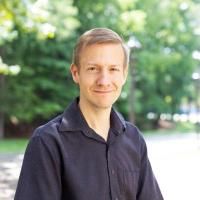We've launched a new site so please go to People & Research for current information on our faculty and staff.
Marc A. Jeuland, Professor
Office Location: 254 Rubenstein Hall, Box 90312, Durham, NC 27708
Duke Box: 90312
Email Address: marc.jeuland@duke.edu
Web Page: http://sites.globalhealth.duke.edu/jeulandresearch/
Web Page: http://sanford.duke.edu/file/2158/download?token=dMRlEKEL
Areas of Expertise
- Environment, Energy, Climate Change
- Health Policy, Global Health
Education:
Ph.D., University of North Carolina, Chapel Hill, 2009
MS, University of North Carolina-Chapel Hill, 2007
B.S., Swarthmore College, 2001
Office Hours:
Wednesday 2:30-4:30 or by appointment
Recent Publications (More Publications)
- Benka-Coker, M; Clark, ML; Jeuland, M; Tadele, W; Rick, F; Ruhinduka, R; Miller, H; Stokes, H; Quinn, A. "An implementation science analysis of an ethanol cooking fuel promotion project in Dar es Salaam, Tanzania." Energy for Sustainable Development 89 (December, 2025). [doi] [abs]
- Lohani, SP; Shrestha, P; Jeuland, M; Kammen, D. "Sustainability and contribution of household biogas plants to energy transition in Nepal.." Scientific reports 15.1 (November, 2025): 37928. [doi] [abs]
- Phillips, J; Cissé, A; Jeuland, M; Lang, ME; Lee, JN; McCord, R; Meeks, R; Patino-Echeverri, D; Singh, M; Slaski, X; Song, R; Zaman, R; Zwane, A. "Incentivizing Grid Reliability: A Framework for Performance-Linked Electricity Improvements in Low- and Middle-Income Countries." Incentivizing Grid Reliability: A Framework for Performance-Linked Electricity Improvements in Low- and Middle-Income Countries. Nicholas Institute; James E. Rogers Energy Access Project, October, 2025: 37 pages. [abs]
- Das, I; Galeos, SKD; Xue, Y; Zong, J; Lewis, JJ; Fujita-Conrads, R; Williams, KN; Troncoso, K; Adair-Rohani, H; Jeuland, M. "The Costs and Benefits of Clean Cooking Policies in Low- and Middle-Income Countries Under Real-World Conditions." Sustainable Development 33.4 (August, 2025): 6108-6123. [doi] [abs]
- Qu, W; Ruhinduka, R; Clark, ML; Benka-Coker, M; Quinn, A; Stokes, H; Tadele, W; Jeuland, M. "The use and impacts of an ethanol cooking fuel promotion pilot in Dar es Salaam." Energy for Sustainable Development 86 (June, 2025). [doi] [abs]
Highlight:
Marc Jeuland is a Professor in the Sanford School of Public Policy, with a joint appointment in the Duke Global Health Institute. His research interests include nonmarket valuation, water and sanitation, environmental health, energy poverty and transitions, trans-boundary water resource planning and management, and the impacts and economics of climate change.
Jeuland's recent research includes work to understand the economic implications of climate change for water resources projects on transboundary river systems, a range of primary data collection projects related to analysis of adoption of environmental health improving technology, and analysis of the costs and benefits of environmental health interventions in developing countries. He has conducted multiple field experiments on issues such as: the role of water quality information in affecting household water and hygiene behaviors; the demand for, and impacts of cleaner cookstoves on household well-being; the long-term sustainability and effects of rural sanitation and water supply projects. He has also collected data on preferences for a range of environmental health improvements including cholera vaccines, household water treatment technologies and improved cookstoves. In the energy and development domain, he is currently working on several projects with the Energy Access Project at Duke, and is a co-founder of the Sustainable Energy Transitions Initiative (SETI), along with Professor Subhrendu Pattanayak and scholars from Chile, China and Ethiopia. His energy portfolio includes work related to evaluation of cleaner cooking interventions, measuring energy access and reliability, and reviews of the drivers and impacts literature related to energy.
Jeuland has worked in the past with the World Bank, USAID, the Millennium Challenge Corporation, UNICEF, and many field-based NGOs and community-based implementing organizations.
Prior to his graduate studies and work with the World Bank, Jeuland was a Peace Corps volunteer in Mali, West Africa, where he designed and monitored construction of a pilot wastewater treatment system and trained management personnel at the plant’s managing firm.
Bio/Profile
Marc Jeuland joined the faculty of the Sanford School of Public Policy at Duke University in July 2010. His research interests include nonmarket valuation, water and sanitation, environmental health, the planning and management of trans-boundary water resources and the impacts and economics of climate change.
Jeuland's recent research projects include analysis of the economic implications of climate change for water resources projects on transboundary river systems, modeling of the costs and benefits of environmental health interventions in developing countries, and a variety of survey-based projects focused at the intersection of environment and development. He has managed a field experiment on the role of water quality information in affecting household water and hygiene behaviors in rural Andhra Pradesh, India, and conducted fieldwork on preferences for cholera vaccines in Beira, Mozambique and water treatment in peri-urban communities in Cambodia.
Jeuland has worked in the past with the World Bank on projects involving economic modeling in the Ganges Basin in Asia, economic planning in the eastern Nile river basin, rural sanitation in Egypt, and wastewater reuse in the Middle East and Northern Africa.
As part of this work,Professor Jeuland recently completed an economic analysis of possible dams in the Blue Nile gorge, for the World Bank (with Dale Whittington at UNC-Chapel Hill). The report, entitled Eastern Nile Strategic Economic Assessment: A Scoping-level Economic Analysis of Multipurpose Dams in the Blue Nile Gorge, examines the economic benefits of the Renaissance Dam, as well as other dam options, to Ethiopia and the downstream riparians. Primary data collection activities were conducted in Sudan to estimate the downstream impacts. The report explores some of the likely implications for basin-wide cooperation of Ethiopia’s decision to build the Renaissance Dam.
Prior to his graduate studies and work with the World Bank, Jeuland was a Peace Corps volunteer in Mali, West Africa, where he designed and monitored construction of a pilot wastewater treatment system and trained management personnel at the plant’s managing firm.
Current Ph.D. Students
- Jennifer Orgill

